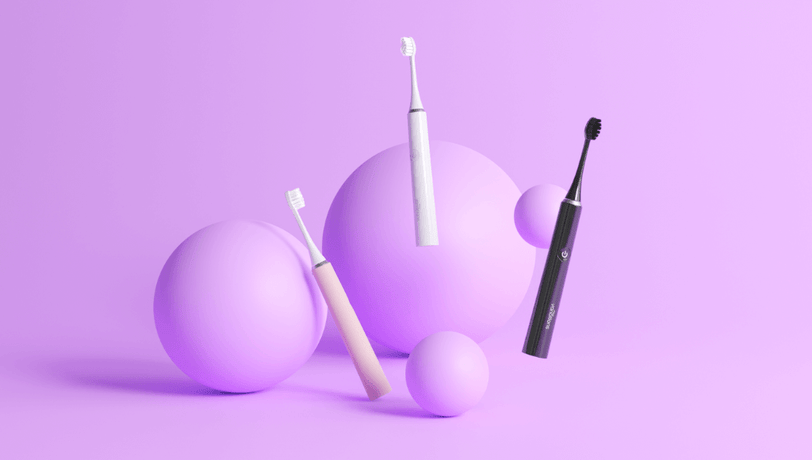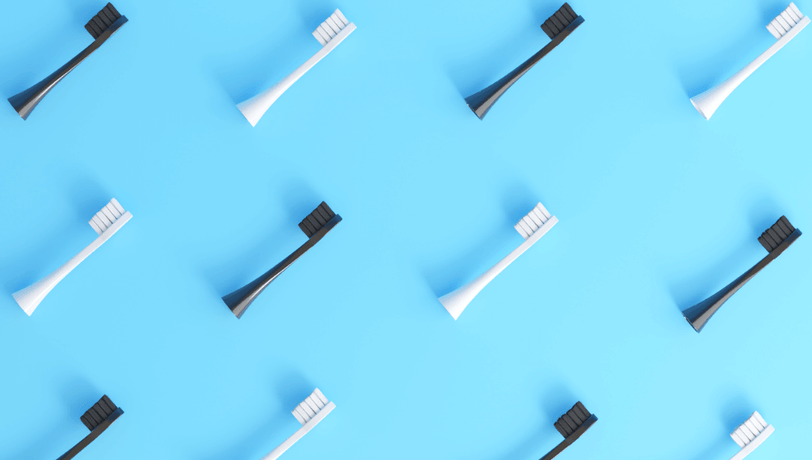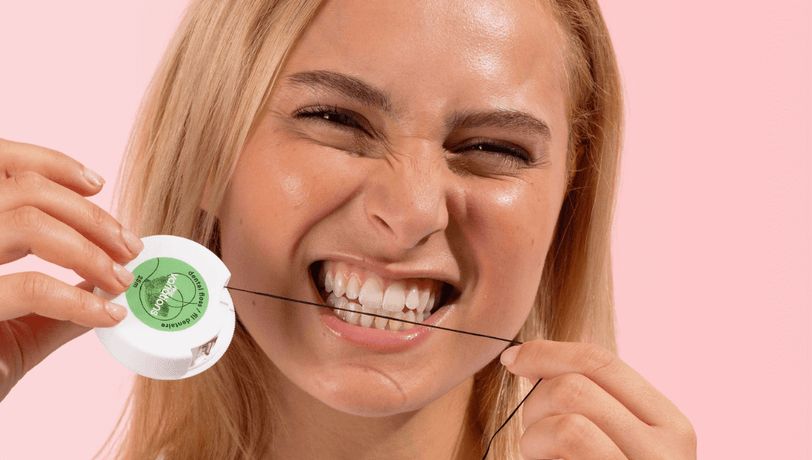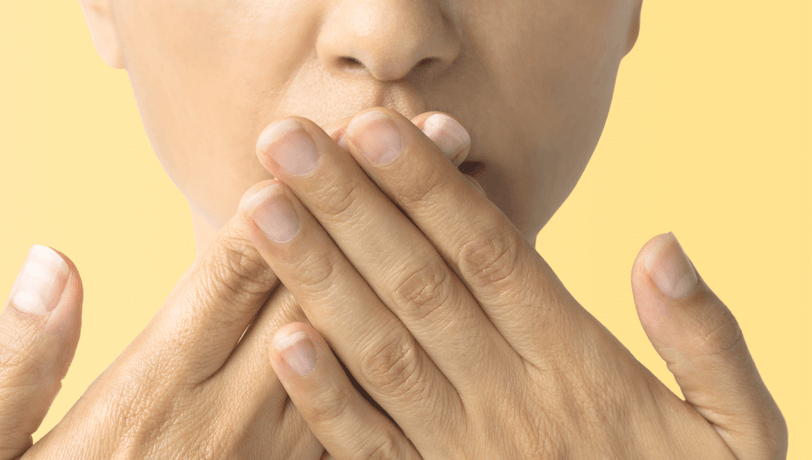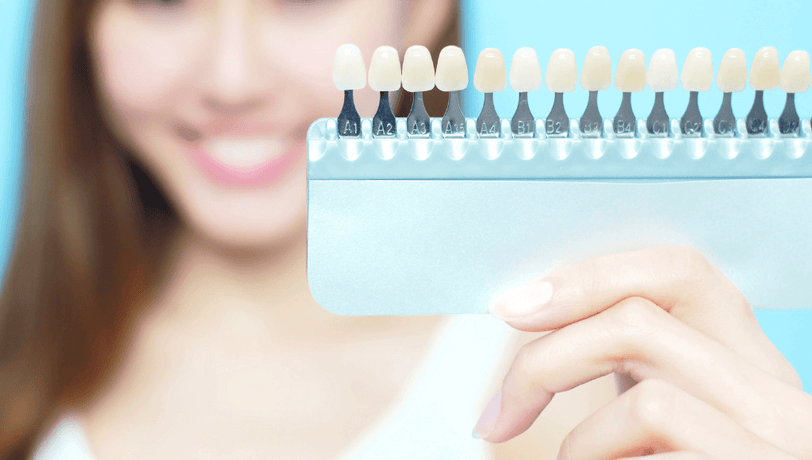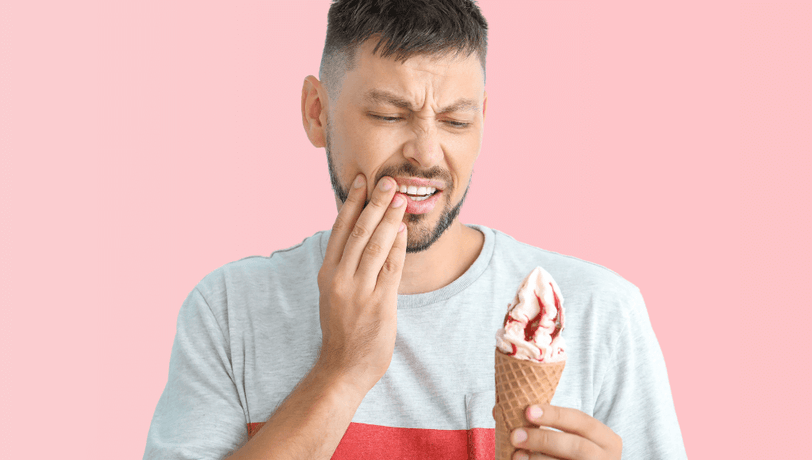
Summary
We've all had this moment: we brush our teeth with toothpaste, we eat or drink, and then we regret it. We feel pain which can even cause bleeding . It's only your gums that are sending you a warning signal: they are irritated . 😫
This irritation phenomenon is common, can arise from several reasons and, fortunately, is reversible. So there's no need to panic...
Why are gums irritated?
It must be said that our gums are put to the test every day ! Between hot , cold , gaseous , repeated brushing or even the use of appliances, they are not idle. Result ? They tire and react with irritation. 😷
Common causes
Too aggressive brushing : bristles that are too hard or not very delicate brushing are a real attack on your gums. Over time, this type of brushing can even cause retractions . And we don't want that.
Improper use of dental floss : did you know that barely 10% of the population uses dental floss ( French Union for Oral Health )? And yet, it has a role in reducing gum problems such as gingivitis. But if dental floss is used abruptly it has the opposite effect: the gum located between the teeth can become irritated.
Home whitening treatments : ah the famous techniques done at home! 🙄 We understand that for the price aspect, we can be tempted, but we do not recommend it. Some products contain strong chemicals, such as hydrogen peroxide. When they are poorly dosed, they are very irritating to your gums. As usual, always seek the advice of a good dentist. 🤓
Food choices : we know you won't like it. Acidic products such as lemon or vinegar, but also spicy dishes, or even hard foods such as dry bread and nuts are poorly tolerated by our gums. And inevitably, sodas, sweets, sweet chewing gum are at the top of the podium.
Other causes : among the daily attackers of our gums, the list can be extended by major competitors:
Poorly fitted dental appliances : they can rub and cause chronic irritation to the gums.
Tobacco : It's no surprise, smoking is the worst for the health of our teeth and gums. It reduces blood supply to the gums, making them more sensitive and prone to inflammation. 🚭
Allergies : it can happen, oral allergy syndrome can cause itching in the mouth and gums. The source can be food (raw fruit, nuts, etc.) as well as external.
We also think of the interference of certain medications, hormonal changes or even diabetes which have an impact on the health of our
Focus on gingivitis
Although it has a barbaric name, this disease nevertheless affects 30% of adults in France . It is even one of the most common causes of irritated gums. This is an inflammation, more or less significant, which comes from an accumulation of dental plaque. This bacterial film covers the surface of the teeth, accumulates and eventually irritates the gum tissues in the mouth.
The problem is that if gingivitis is not treated, it can develop into periodontitis ; a more serious disease that damages the tissues supporting the tooth. 😧
How to identify the symptoms of receding gums?
Receding gums manifests itself by various symptoms. In people suffering from this disorder, it is common to notice the appearance of black triangles . In reality, these are not marks, but rather spaces that are created at the junction of two teeth and the gum. These are in the form of triangles, hence their name. 🔼
If one or more of your teeth appear longer than they should be, you may have gum recession . Indeed, as the gums gradually disappear, the base of the tooth becomes more and more visible. This gives the impression that its size is increasing even though it remains the same. 🦷
When the gums recede, the tooth's sensitivity increases. Indeed, faced with gingival recession, the tooth root gradually loses its protection and becomes vulnerable to external threats . Likewise, teeth become more and more sensitive to hot, cold and sugar . ❄️ As the tooth root is exposed, two different shades are visible on the tooth.
Redness and bleeding of the gums are among the symptoms that characterize gum recession. In fact, bacteria often attack the gums of people with a poor oral hygiene routine . 🦠 In addition to making it bleed, these pathogens leave traces of redness and sometimes, pain. This inflammation is sometimes the consequence of periodontal disease or gingivitis.
Generally, these pathologies are the cause of receding gums. They are likely to reach a more advanced stage and thus lead to tooth loss.
So how to recognize gingivitis?
Here are the symptoms:
Frequent bleeding, especially when brushing or flossing 🩸
Persistent bad breath 🤢
If you experience these types of ailments, head to the dentist! Only he will be able to direct you towards the best remedies at all costs.
Irritated gums: prevent and cure
After the problems, let's move on to the solutions! It would not be a question of leaving evil in your mouth. As we have mentioned, having irritated gums is fortunately not irreversible. Here is the action plan!
Hygiene. Hygiene. Hygiene…
Obviously, you know the old adage “better safe than sorry”. Once again, it applies in this case. We can't repeat it enough: having good oral hygiene is the priority to fight against gum irritation . Here are our tips:
Adopt a suitable brushing technique : yes, there is good and bad technique... Brushing movements are gentle, circular. Moreover, the UFSBD noted that 76% of people who participated in their study saw their gums bleed regularly when brushing. 😥
Use soft products : the soft toothbrush and toothpaste combo will always be better than one with hard bristles. We also think of toothpaste, it also has its role to play. The ideal is to turn to products with soothing products such as sodium fluoride or chlorhexidine. And avoid sodium lauryl sulfate. 🚫
Frequency of flossing : once a day to remove food residue, as well as dental plaque. Since these areas make up up to 40% of the tooth surface, take care of them. ❤️🩹
Use of mouthwash : a good mouthwash allows you to complete toothwashing with toothpaste. Result ? A clean mouth for happy gums. 🛁
Having the right tools : here we come, the choice of your toothbrush necessarily has an impact on the health of your gums. And no need to pay a big price. Numerous studies have often proven the performance of electric toothbrushes. For example, the Journal of Clinical Periodontology worked for 11 years to demonstrate that using an electric toothbrush is associated with better gingival health compared to a manual brush.
Regular follow-up and care at the dentist 👨⚕️
Go to your dentist at least once a year, or even every six months for smokers. And this, even if everything is going well! This is a good way to detect early signs of gingivitis or periodontal disease. Please note that 50% of adults suffer from a form of gingivitis ( WHO ), often undiagnosed.
When it comes to in-office care, scaling remains the most important, whatever its price. This technique very effectively eliminates plaque and tartar in the mouth, the main causes of gingival irritation. In addition, he will advise you on the right toothpaste or mouthwash, so you can leave happy.
A healthy mouth in a healthy body 🌿
Taking care of your gums also means taking care of your whole body. But cultivating a very healthy lifestyle, every day, is not easy. Because the health of your mouth is closely linked to that of your body, let's look at how to achieve this.
Towards a balanced diet
What you put on your plate directly impacts the health of your gums. Here are the foods that boost your natural defenses:
Vitamin C : citrus fruits, peppers and kiwis strengthen gingival tissues and accelerate their healing.
Vitamin D : fatty fish and eggs promote calcium absorption for healthy gums. It reduces gingival inflammation by 20%.
Crunchy foods : carrots, celery and apples stimulate saliva production, naturally cleaning teeth.
Limit sugar and acidity : they promote bacteria and enamel erosion. Daily soda increases the risk of cavities.
Stay hydrated 💧
A hydrated mouth is a better protected mouth. Indeed, saliva is a good soldier for your gums; it neutralizes the acids produced by bacteria and protects your gums from irritation. The ideal is to drink at least 1.5 to 2 liters of water per day. Also, alcohol and coffee in excess are dehydrating. And your gums are not fans of that. 🫣
Tobacco is taboo
We are talking about the number one enemy of your gums here. Because in addition to reducing blood circulation, it weakens the natural defenses and slows down the healing of the gums. Please also note that, according to the American Journal of Preventive Medicine, smokers are 85% more likely to suffer from periodontal disease than non-smokers .
Relieve with home remedies
In cases of moderate discomfort, certain tips have proven to be effective. Simple things you can try at home:
Natural mouthwash : Try rinsing your mouth with a solution of warm salt water, or half a teaspoon of salt in a glass of water. Chamomile is also a good option thanks to its anti-inflammatory properties.
Local applications : for example, you can apply aloe vera gel directly to your gums. Tea tree essential oil is also effective; you dilute it in a neutral vegetable (coconut oil for example) and apply a small amount to your gums.
Medical treatments
In case of severe or persistent pain, medications are effective in relieving the inflammation of your gums. Not surprisingly, anti-inflammatories remain universal and offer a good reduction in your pain. But, this remains a temporary resolution to the problem.
Your preferred dentist can perform specific treatments in the office: scaling, polishing, use of antiseptic gels, etc. These treatments can speed up the healing of your gums.
Conclusion: take care of your gums 🦷✨
Having gum inflammation is not inevitable. It simply reminds us of the importance of taking care of our mouths every day. Whether through impeccable oral hygiene, specific toothpaste, a balanced diet or even regular visits to the dentist, there are many solutions to prevent and cure these discomforts. And this, without putting too high a price!
Adopting good habits not only preserves the health of your gums, but also that of your entire body. A healthy mouth contributes to a better quality of life and strengthens your overall well-being. So listen to your gums and give them the attention they deserve. Your smile will thank you, and your health too! 😊































